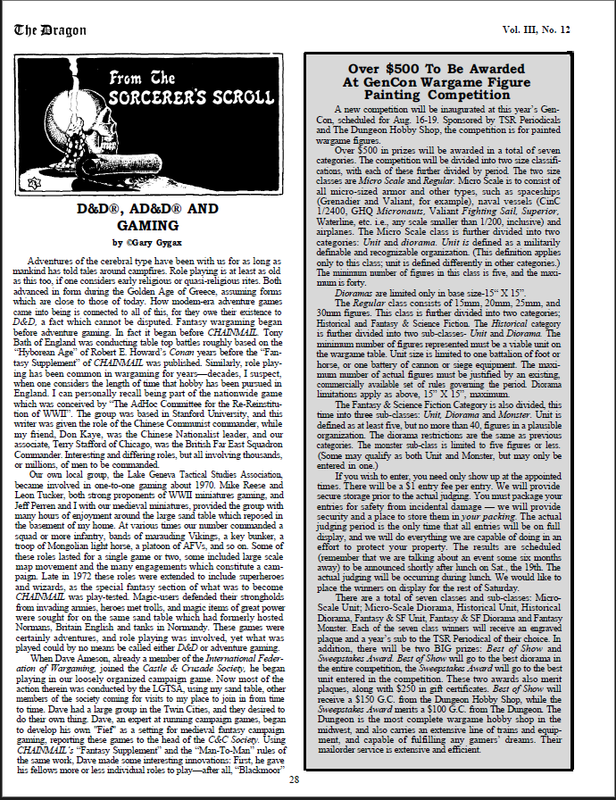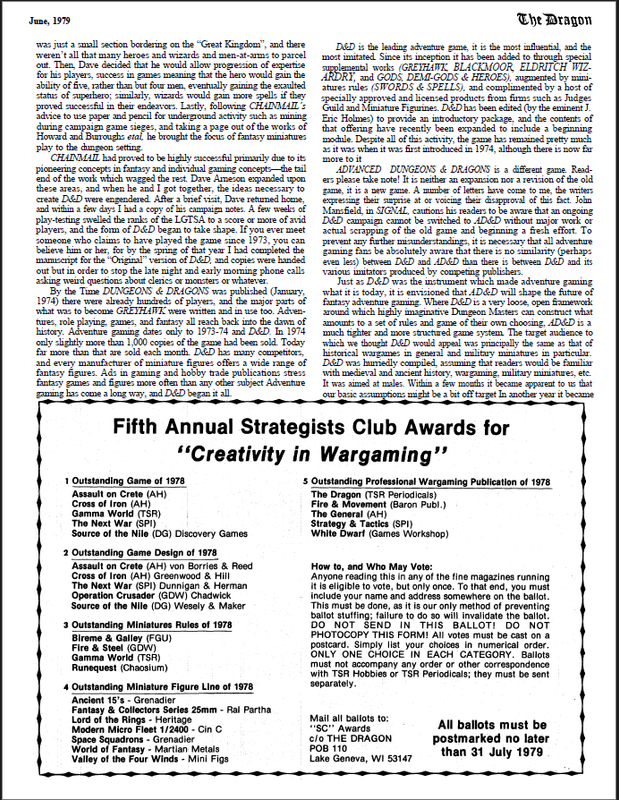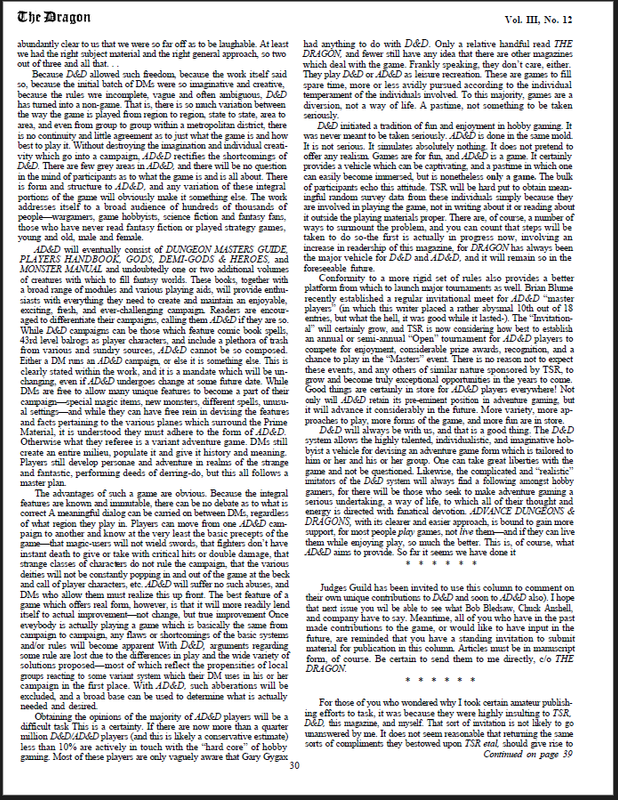We have a Steam curator now. You should be following it. https://store.steampowered.com/curator/44994899-RPGHQ/
Baldur's Gate 3 isn't an RPG
Here is an article written by Gary Gygax in the Dragon Magazine #26 issue. He discusses the evolution of adventure gaming and what his goals were with his part in them. It is an interesting read.
► Show Spoiler
RPGs really have nothing to do with what you think they do.
The only thing that matters is that you can play the role of the character you are given. If that's within the constraints of being in a strait-jacket, it still doesn't make it any less true, if you are able to for example, thrash about in your padded cell.
While it can be harder to see a game as an RPG when you are for example, Geralt in TW3 where your agency is more or less non-existent (I would say it's an action adventure personally, since you are ONLY 'Geralt' as imagined by CDPR, you do not play his role, you simple control him and observe the role played out for you). But really it has nothing to do with game mechanics or story elements.
It, to me, seems pretty simple. Do you actually 'play' the role of the character, or do you simply 'observe'. You can observe a self-made character, and equally, you can play a premade character. It's got nothing to do with the story, and actually it doesn't have much to do with choice either, at least, not the sort of choice you think.
Ultimately, it has to be possible to believe that, in the setting you are in, you are able to 'be' the character. That is to say, act in a way that he or she would, and not necessarily to be able to do absolutely anything.
Another point though - in the context of BG3 you would not 'avoid' the parasite since you would die if you did, that would spur literally anyone on, to find solutions. Ironically this is what really makes you believe you could 'be' the character, it is a believable reaction. Doing nothing about it, and being able to do nothing about it would in fact damage the roleplaying element significantly.
But maybe I'm wrong.
The only thing that matters is that you can play the role of the character you are given. If that's within the constraints of being in a strait-jacket, it still doesn't make it any less true, if you are able to for example, thrash about in your padded cell.
While it can be harder to see a game as an RPG when you are for example, Geralt in TW3 where your agency is more or less non-existent (I would say it's an action adventure personally, since you are ONLY 'Geralt' as imagined by CDPR, you do not play his role, you simple control him and observe the role played out for you). But really it has nothing to do with game mechanics or story elements.
It, to me, seems pretty simple. Do you actually 'play' the role of the character, or do you simply 'observe'. You can observe a self-made character, and equally, you can play a premade character. It's got nothing to do with the story, and actually it doesn't have much to do with choice either, at least, not the sort of choice you think.
Ultimately, it has to be possible to believe that, in the setting you are in, you are able to 'be' the character. That is to say, act in a way that he or she would, and not necessarily to be able to do absolutely anything.
Another point though - in the context of BG3 you would not 'avoid' the parasite since you would die if you did, that would spur literally anyone on, to find solutions. Ironically this is what really makes you believe you could 'be' the character, it is a believable reaction. Doing nothing about it, and being able to do nothing about it would in fact damage the roleplaying element significantly.
But maybe I'm wrong.
That description is meaningless though as it ignores not only the historical progression of its origin and evolution in computer gaming, but the very language to which it refers. It is not simply about the role, it is about the game of the role. When taken into context with its origin, it logically narrows its categorization.TKVNC wrote: ↑ March 13th, 2024, 14:07RPGs really have nothing to do with what you think they do.
The only thing that matters is that you can play the role of the character you are given. If that's within the constraints of being in a strait-jacket, it still doesn't make it any less true, if you are able to for example, thrash about in your padded cell.
While it can be harder to see a game as an RPG when you are for example, Geralt in TW3 where your agency is more or less non-existent (I would say it's an action adventure personally, since you are ONLY 'Geralt' as imagined by CDPR, you do not play his role, you simple control him and observe the role played out for you). But really it has nothing to do with game mechanics or story elements.
It, to me, seems pretty simple. Do you actually 'play' the role of the character, or do you simply 'observe'. You can observe a self-made character, and equally, you can play a premade character. It's got nothing to do with the story, and actually it doesn't have much to do with choice either, at least, not the sort of choice you think.
Ultimately, it has to be possible to believe that, in the setting you are in, you are able to 'be' the character. That is to say, act in a way that he or she would, and not necessarily to be able to do absolutely anything.
Another point though - in the context of BG3 you would not 'avoid' the parasite since you would die if you did, that would spur literally anyone on, to find solutions. Ironically this is what really makes you believe you could 'be' the character, it is a believable reaction. Doing nothing about it, and being able to do nothing about it would in fact damage the roleplaying element significantly.
But maybe I'm wrong.
It is like the mention that games are just entertainment? Sure... they are played often for that purpose, but not all games are for entertainment and not all entertainment is a game.
Role is the same issue. If we use role in the manner you do, it encompasses most all games, but are all games really role playing games? No.
So, what is the logical manner in which we narrow it to more properly identify it?
I would argue, Origin (historical influence through war games, chainmail, D&D, AD&D) as well as the base focus being as you said (on role), but more specifically the "game" of that role within the environment it is applied to a story progression. That is, you develop a character specifically (attributes, skills, etc...) and test it through various obstacles and conditions to see how well those development choices hold up to any given situation. The more player influence through other means which circumvent that roles makeup (outside of strategic application of the role), the less it becomes an RPG and more of some other genre.
I didn't mnetion 'game' since really I thought that was self-evident. I would say in regards to play the role, I wouldn't say that encompasses most games, most I would say you observe the role, but I take your point.Xenich wrote: ↑ March 13th, 2024, 14:27That description is meaningless though as it ignores not only the historical progression of its origin and evolution in computer gaming, but the very language to which it refers. It is not simply about the role, it is about the game of the role. When taken into context with its origin, it logically narrows its categorization.TKVNC wrote: ↑ March 13th, 2024, 14:07RPGs really have nothing to do with what you think they do.
The only thing that matters is that you can play the role of the character you are given. If that's within the constraints of being in a strait-jacket, it still doesn't make it any less true, if you are able to for example, thrash about in your padded cell.
While it can be harder to see a game as an RPG when you are for example, Geralt in TW3 where your agency is more or less non-existent (I would say it's an action adventure personally, since you are ONLY 'Geralt' as imagined by CDPR, you do not play his role, you simple control him and observe the role played out for you). But really it has nothing to do with game mechanics or story elements.
It, to me, seems pretty simple. Do you actually 'play' the role of the character, or do you simply 'observe'. You can observe a self-made character, and equally, you can play a premade character. It's got nothing to do with the story, and actually it doesn't have much to do with choice either, at least, not the sort of choice you think.
Ultimately, it has to be possible to believe that, in the setting you are in, you are able to 'be' the character. That is to say, act in a way that he or she would, and not necessarily to be able to do absolutely anything.
Another point though - in the context of BG3 you would not 'avoid' the parasite since you would die if you did, that would spur literally anyone on, to find solutions. Ironically this is what really makes you believe you could 'be' the character, it is a believable reaction. Doing nothing about it, and being able to do nothing about it would in fact damage the roleplaying element significantly.
But maybe I'm wrong.
It is like the mention that games are just entertainment? Sure... they are played often for that purpose, but not all games are for entertainment and not all entertainment is a game.
Role is the same issue. If we use role in the manner you do, it encompasses most all games, but are all games really role playing games? No.
So, what is the logical manner in which we narrow it to more properly identify it?
I would argue, Origin (historical influence through war games, chainmail, D&D, AD&D) as well as the base focus being as you said (on role), but more specifically the "game" of that role within the environment it is applied to a story progression. That is, you develop a character specifically (attributes, skills, etc...) and test it through various obstacles and conditions to see how well those development choices hold up to any given situation. The more player influence through other means which circumvent that roles makeup (outside of strategic application of the role), the less it becomes an RPG and more of some other genre.
But you are right, fundamentally, it's all from the context of obstacle and test, without that it's really just a sandbox, or a story, not a 'game'.
- WhiteShark
- Turtle

- Posts: 2097
- Joined: Feb 2, '23
Not sure what you mean by story progression, @Xenich. RPGs began as subtactical-scale wargames. There's no such thing as a story in a proper (tabletop) RPG because that implies a predetermined progression of events. RPGs produce a series of events in play that can be interpreted as a story after the fact but are essentially a history.
I also think you're being influenced by design choices from later D&D in your analysis. Skills didn't even exist originally and players were meant to apply their own intellectual capabilities to overcome challenges. The blow-by-blow part of combat was left to the dice because it's a wargame and wargames are concerned with your decision-making capabilities, not your knowledge of man-to-man martial arts. Developmental choices basically didn't exist aside from your choice of class—if you even had a choice, considering that attribute rolls came first.
I will try to refine and complete my definition from before. In light of their origin and the original usage of the term, and not being distracted by other uses of the term 'roleplaying', I would define RPG like so: "A wargame in which each player directly controls one character which serves as his avatar and by which he interacts with an imaginary world that responds reasonably based on a set of rules, using randomness to determine uncertain outcomes, and the arbitration of a referee."
I also think you're being influenced by design choices from later D&D in your analysis. Skills didn't even exist originally and players were meant to apply their own intellectual capabilities to overcome challenges. The blow-by-blow part of combat was left to the dice because it's a wargame and wargames are concerned with your decision-making capabilities, not your knowledge of man-to-man martial arts. Developmental choices basically didn't exist aside from your choice of class—if you even had a choice, considering that attribute rolls came first.
I will try to refine and complete my definition from before. In light of their origin and the original usage of the term, and not being distracted by other uses of the term 'roleplaying', I would define RPG like so: "A wargame in which each player directly controls one character which serves as his avatar and by which he interacts with an imaginary world that responds reasonably based on a set of rules, using randomness to determine uncertain outcomes, and the arbitration of a referee."
Last edited by WhiteShark on March 13th, 2024, 14:51, edited 2 times in total.
Well, I am going along more of Gygax's view on the progression. As you said, early adventure games (the war scenarios) were still driven by statistics of the armies and sub groups. Later that was translated to individual units with Chainmail, and when you continue on to D&D, the essence of that was placed to the individual characters. With AD&D, Gygax was trying to realize his original intent that was missed with D&D to create a more structured environment for this type of dice roll play. Yes, very similar to that of the early war game systems, but more defined and detailed as they had sought with Chainmail and ultimately AD&D, but the other significant feature was applying it to story progression to interact within the world (which was itself a structured environment of obstacles through statistical encounters).WhiteShark wrote: ↑ March 13th, 2024, 14:50Not sure what you mean by story progression, @Xenich. RPGs began as subtactical-scale wargames. There's no such thing as a story in a proper (tabletop) RPG because that implies a predetermined progression of events. RPGs produce a series of events in play that can be interpreted as a story after the fact but are essentially a history.
I also think you're being influenced by design choices from later D&D in your analysis. Skills didn't even exist originally and players were meant to apply their own intellectual capabilities to overcome challenges. The blow-by-blow part of combat was left to the dice because it's a wargame and wargames are concerned with your decision-making capabilities, not your knowledge of man-to-man martial arts. Developmental choices basically didn't exist aside from your choice of class—if you even had a choice, considering that attribute rolls came first.
I will try to refine and complete my definition from before. In light of their origin and the original usage of the term, and not being distracted by other uses of the term 'roleplaying', I would define RPG like so: "A wargame in which each player directly controls one character which serves as his avatar and by which he interacts with an imaginary world that responds reasonably based on a set of rules, using randomness to determine uncertain outcomes, and the arbitration of a referee."
So, if you have a game that is tactical situations like simple war board games, the story is not the focus, merely events of tactical encounters with dice comparisons on unit conflict, but with AD&D RPG's it was all of that applied to a story to given flow and progression to the play. The core focus was surely, always the statistical conflict, but the story I think is still a needed component to differentiate it from a simple tactical game. Now how much is needed, maybe that becomes more of a subjective issue, I don't know.
Over all though, when I say "stats", I am not specifically claiming it as such as much as I am saying that the individual unit has features that are statistically measured for the obstacles they encounter. (as your definition already states)
I would say your definition is pretty spot on. The only thing I am not sure on is story. That is, would not that definition fit for instance many table top war games? I guess my contention would be the difference between story progression (as for instance an AD&D module provides) and that of simply a chess style game with stats placed in a setting to which most board based games are. They are two very different approaches to play, so how would you segregate them? I think that is why I place story in there, because it seems to segregate the styles, and again fits in line with the progression Gygax was getting at.
- WhiteShark
- Turtle

- Posts: 2097
- Joined: Feb 2, '23
@Xenich I think you're confusing story with simulation. A typical wargame has a setting but it doesn't try to simulate it. It rigidly defines the possible actions and has no rules to address anything but directly fighting your opponent. The thing that makes RPGs special is that they attempt to simulate a world, not just a narrow scenario; the setting isn't just background fluff, but something that acts and reacts as though it were real. The progression of which you speak is just the natural development of the back and forth between players and world. It's something one can tell a story about, just as with real history, but it isn't a pre-planned narrative.
Last edited by WhiteShark on March 13th, 2024, 15:19, edited 1 time in total.
Maybe so. I think that is a fair explanation. To be honest, I never considered that level of evaluation on it. Makes sense.WhiteShark wrote: ↑ March 13th, 2024, 15:19@Xenich I think you're confusing story with simulation. A typical wargame has a setting but it doesn't try to simulate it. It rigidly defines the possible actions and has no rules to address anything but directly fighting your opponent. The thing that makes RPGs special is that they attempt to simulate a world, not just a narrow scenario; the setting isn't just background fluff, but something that acts and reacts as though it were real. The progression of which you speak is just the natural development of the back and forth between players and world. It's something one can tell a story about, just as with real history, but it isn't a pre-planned narrative.
- TheCumGuzzler
- Posts: 48
- Joined: Mar 13, '24
I can't describe how much I dislike BG3, mostly because of 5e and the horrendous writing and story but it's definitely an RPG, just not a good one.







